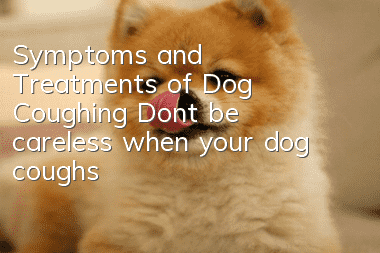Symptoms and Treatments of Dog Coughing Don’t be careless when your dog coughs!

Symptoms of cough in dogs
Infectious bronchitis in dogs, a single mild case of canine symptoms is a dry cough, followed by vomiting. The cough is often aggravated with exercise or changes in temperature. Artificial Induced cough is positive. When secretions block part of the respiratory tract, symptoms include depression, loss of appetite, purulent nasal discharge, and persistent retching or vomiting after painful coughing. Canine parainfluenza often develops suddenly, with body temperature rising, serous fluid or even purulent nasal fluid, severe coughing, decreased appetite, and mental exhaustion in sick dogs. A few can cause hindquarter paralysis and hemorrhagic enteritis symptoms. Canine herpes virus disease mostly occurs in dogs under 3 weeks old. Dogs aged 2 to 3 weeks old will have symptoms of upper respiratory tract infection such as loss of appetite, salivation, diarrhea, runny nose, sneezing, dry cough, and low body temperature. , causing miscarriage, vaginitis, and blister-like lesions on the vaginal mucosa in female dogs. The main symptoms of canine tuberculosis are fever, gradual weight loss, long-term stubborn cough, and rales in the lungs.
Treatment of dog cough
Cough caused by canine distemper is mainly treated with canine distemper, which mainly consists of hyperimmune serum or immunoglobulin, ampicillin sodium, Shuanghuanglianhe Ribavirin treatment. Canine infectious bronchitis can be treated with ampicillin or kanamycin nasal drops. In addition to being anti-inflammatory and antitussive, it can also be treated with hyperimmune serum, intramuscular injection of kanamycin, and intravenous infusion of Shuanghuanglian and ampicillin. and other methods to treat canine parainfluenza. Subcutaneous injection of S can reduce canine herpes virus infection. Sera from convalescent bitches and canine butyric acid globulin preparations; canine tuberculosis can be treated with isoniazid (4mg-6mg/kg) twice daily. Streptomycin can also be given intramuscularly (10 mg/kg) twice daily for one week. Coughs caused by parasitic diseases are mainly caused by deworming agents. To treat lobar pneumonia, bronchopneumonia, tracheitis, and bronchitis, intravenous infusion of Shuanghuanglian, ampicillin, and ofloxacin can be used. In addition, the mixing effect of aminophylline, dexamethasone and compound licorice mixture is good. For tracheal paralysis, aminophylline or ephedrine hydrochloride can be taken orally. Use closed throat injection of procaine penicillin, intravenous injection of ampicillin and Shuanghuanglian at the same time, intramuscular injection of Bupleurum and ampicillin when cold, and intravenous injection of ampicillin and Shuanghuanglian in severe cases. Ordinary cold medicine can also be taken orally.
- How to treat fungal dermatitis in dogs
- Common causes and treatments for dog diarrhea (diarrhea)
- Why is the puppy not active?
- Symptoms of rickets in dogs
- Causes of Calcium Deficiency in Dogs
- Dog colds should not be underestimated, what should we do?
- What is canine stomatitis? What are the causes of canine stomatitis in dogs?
- Causes of prostatic hypertrophy in dogs | Diagnosis | Prevention and treatment methods
- How to prevent and treat eczema in dogs?
- What should I do if my Corgi vomits after eating too much?



